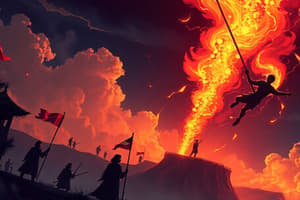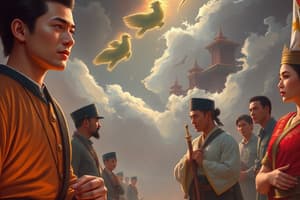Podcast
Questions and Answers
What was the primary aim of the Katipunan and the Kartilya ng Katipunan?
What was the primary aim of the Katipunan and the Kartilya ng Katipunan?
- To seek independence from foreign rule
- To promote social justice and moral standards (correct)
- To establish a monarchy in the Philippines
- To create a military dictatorship
Which of the following values was NOT promoted by Emilio Jacinto's 'Kartilya'?
Which of the following values was NOT promoted by Emilio Jacinto's 'Kartilya'?
- Justice
- Equality
- Wealth accumulation (correct)
- Freedom
In what year did Emilio Jacinto join the Katipunan?
In what year did Emilio Jacinto join the Katipunan?
- 1896
- 1894 (correct)
- 1890
- 1898
What nickname was Emilio Jacinto known by within the Katipunan?
What nickname was Emilio Jacinto known by within the Katipunan?
Which event does the 'Kartilya' symbolize in Filipino history?
Which event does the 'Kartilya' symbolize in Filipino history?
What was a significant consequence of the principles laid out in the Kartilya?
What was a significant consequence of the principles laid out in the Kartilya?
Where are the remains of Emilio Jacinto located?
Where are the remains of Emilio Jacinto located?
What role did Emilio Jacinto serve in the Katipunan?
What role did Emilio Jacinto serve in the Katipunan?
What major shift occurred in Philippine society during the transition to an American-assimilated culture?
What major shift occurred in Philippine society during the transition to an American-assimilated culture?
What does the term 'sexual revolution' refer to in the context of 1930s Philippine society?
What does the term 'sexual revolution' refer to in the context of 1930s Philippine society?
How did the United States maintain control over Filipinos in the depicted cartoons?
How did the United States maintain control over Filipinos in the depicted cartoons?
What issue persists in Philippine society as mentioned in the provided content?
What issue persists in Philippine society as mentioned in the provided content?
What was depicted in a cartoon regarding Filipino criminals and their treatment by police authorities?
What was depicted in a cartoon regarding Filipino criminals and their treatment by police authorities?
What element is primarily used in political cartoons to convey social and political commentary?
What element is primarily used in political cartoons to convey social and political commentary?
Which of the following accurately reflects the political climate in the Philippines during the American era?
Which of the following accurately reflects the political climate in the Philippines during the American era?
What was one significant issue depicted through the political cartoons of the American period?
What was one significant issue depicted through the political cartoons of the American period?
Who was the artist known for drawing cartoons that commented on the workings of Manila Police?
Who was the artist known for drawing cartoons that commented on the workings of Manila Police?
Which political party was notably favored by the U.S. during the American occupation in the Philippines?
Which political party was notably favored by the U.S. during the American occupation in the Philippines?
What does Uncle Sam symbolize in the political cartoons of the American period?
What does Uncle Sam symbolize in the political cartoons of the American period?
What was a major outcome of the socio-political changes during the American era in the Philippines?
What was a major outcome of the socio-political changes during the American era in the Philippines?
Which aspect of Filipino politics was highlighted as a challenge during the American period?
Which aspect of Filipino politics was highlighted as a challenge during the American period?
Flashcards are hidden until you start studying
Study Notes
Katipunan and Kartilya ng Katipunan
- The Katipunan and "Kartilya ng Katipunan" represent a movement beyond just independence – they sought a moral and socially just Filipino society.
- Aggressive opposition and ideological reform united Filipino aspirations for liberty.
- Emilio Jacinto's "Kartilya" served as the moral and philosophical guide for the Katipunan, emphasizing the connection between genuine independence and virtue.
- The Katipunan and "Kartilya" laid the groundwork for Filipino nationalism and the continuous pursuit of social equality.
The Importance of "Kartilya"
- "Kartilya" showcases the Filipino people's persistent fight for independence from Spain throughout the 18th and 19th centuries.
- It upholds strong morality and nationalism, nurturing the spirit of Filipino identity.
- It inspired nationalism among Filipinos.
- The Katipunan's principles and bravery paved the way for future resistance, culminating in the successful revolution against Spanish rule.
Importance of the Katipunan (KKK)
- KKK was crucial in leading the Filipino revolution against Spanish colonization.
- It symbolizes resistance, nationalism, and self-determination.
- Emilio Jacinto's "Kartilya" provided the ethical foundation for the Katipunan, promoting values like equality, freedom, and justice, guiding the "katipuneros".
- KKK and the "Kartilya" remain relevant as symbols of national pride, inspiring Filipinos to fight for human rights, democracy, and social justice in modern society.
Emilio Jacinto (1875-1899)
- Father: Mariano Jacinto
- Mother: Josefa Dizon
- Born: Tondo, Manila, December 15, 1875
- Studied: Colegio de San Juan de Letran and University of Santo Tomas (law)
- Joined the Katipunan: 1894, at age 19
- Roles: Advisor on fiscal matters and secretary to Andres Bonifacio
- Nicknames: “Utak ng Katipunan” (Brain of the Katipunan), pen name "Dimasilaw", alias "Pingkian" in the Katipunan
- Death: April 16, 1899, Magdalena, Laguna (malaria)
- Burial: Himlayang Pilipino Memorial Park, Quezon City
Political Cartoons in the American Era
- Political cartoons are a modern art form that utilizes exaggeration and symbolism to criticize power figures and comment on social and political issues.
- Alfred McCoy, in his book "Philippine Cartoons: Political Caricature of the American Era (1900-1941)", analyzes cartoons from this period, revealing their significance for understanding Philippine history.
American Influence and Filipino Politics
- The American era (1900-1941) brought substantial political and social changes to the Philippines, including the introduction of democracy and modernization.
- However, social class disparities persisted, with the upper class (principalia) benefiting while the poor faced poverty and state repression.
- Political cartoons exposed the challenges posed by the transition to American-style democracy, revealing a struggle to grasp democratic principles and the rise of dynastic politics.
- Patronage became influential, with the U.S. favoring the Federalista party, creating an imbalance in political competition.
Social Change and Cultural Transformations
- The transition to American influence brought rapid changes, evident in the rise of motorized vehicles and the "sexual revolution" of the 1930s.
- The increase in taxis led to chaos in urban areas due to lax enforcement of transportation laws.
- The "sexual revolution" saw young people challenging conservative norms with bolder, more public displays of affection, reflecting a clash between traditional values and emerging ideas of freedom.
Commentary on Social Issues
- Political cartoons shed light on the conditions of poor Filipinos under American rule, showing a continuation of social inequalities.
- A cartoon depicting police authorities oppressing petty criminals while ignoring wealthier hoarders illustrates social injustices and exploitation.
- Another cartoon signifies American control over Filipinos through seemingly harmless objects, suggesting a subtle yet effective form of subjugation.
Studying That Suits You
Use AI to generate personalized quizzes and flashcards to suit your learning preferences.




